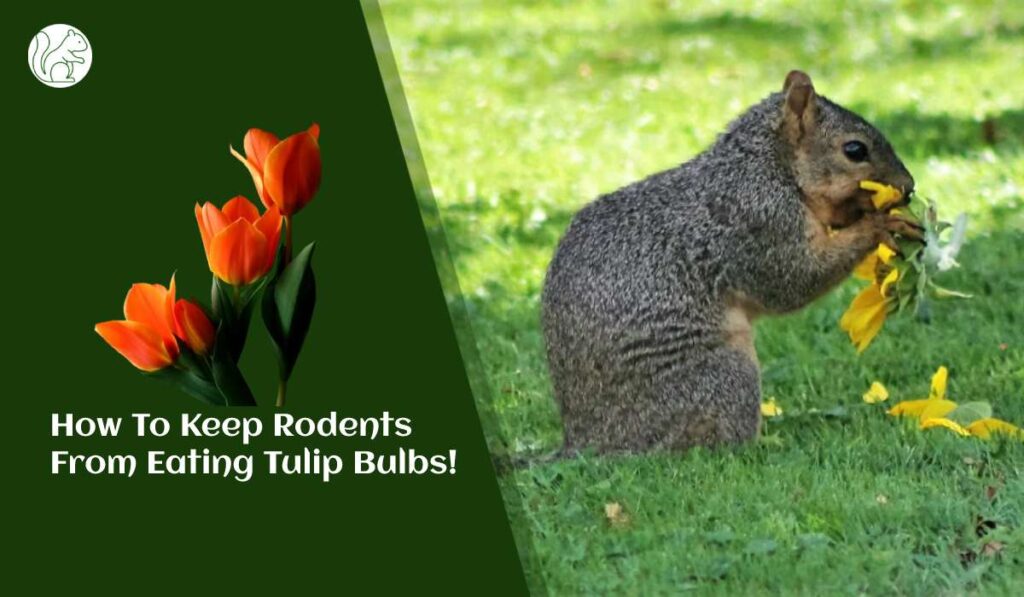Tulips are a beautiful addition to any garden, but unfortunately, rodents love to snack on their bulbs. If you’re a gardener, you’ve probably dealt with this problem before. It’s frustrating to plant tulip bulbs, only to have them dug up and eaten by pesky rodents. However, with a few simple steps, you can protect your tulip bulbs from rodents and enjoy a beautiful, blooming garden. In this article, we’ll cover the best methods for keeping rodents from eating your tulip bulbs.

Choose Bulbs Wisely:
When selecting tulip bulbs to plant, consider choosing varieties that are less attractive to rodents. Rodents tend to avoid bulbs with strong odors or tastes, so bulbs that are bitter, acidic, or spicy are less likely to be eaten. Some varieties that may be less appealing to rodents include Fritillaria, Allium, and Hyacinth. However, keep in mind that no bulb is completely immune to rodent damage, so it’s still important to take other preventative measures.
Plant Bulbs at the Right Depth:
Plant tulip bulbs at a depth of at least six inches. This will make it more difficult for rodents to detect and dig up the bulbs. Additionally, make sure the soil is packed tightly around the bulbs to prevent rodents from tunneling underneath.
Use Physical Barriers:
One of the most effective ways to protect tulip bulbs from rodents is to create a physical barrier around them. You can use wire mesh or hardware cloth to create a cage around the bulbs. Bury the mesh at least six inches deep to prevent rodents from digging underneath it. You can also use protective sleeves made from PVC pipe or plastic mesh to protect individual bulbs. If using a cage or sleeve, make sure to leave enough room for the tulip leaves and stem to grow through.
Repellents:
There are a variety of natural and commercial repellents that may help deter rodents from eating tulip bulbs. Some natural repellents include garlic, onions, and hot pepper spray. Simply mix these ingredients with water and spray around the planting area. You can also purchase commercial repellents that contain natural or synthetic ingredients. However, keep in mind that some of these repellents may have a strong odor that is unpleasant for humans as well as rodents.
Traps:
Traps can also be an effective way to control rodent populations in your garden. Snap traps and live traps are both options. Snap traps kill rodents instantly, while live traps allow you to catch and release them elsewhere. Place traps near areas where you have seen signs of rodent activity, such as chewed leaves or dug-up bulbs. Check traps daily and dispose of any dead rodents promptly.
Clean Up:
After tulips have bloomed, be sure to remove any dead foliage or petals. Rodents are attracted to decaying plant material, so removing it promptly can help deter them from your garden. Additionally, avoid leaving any food or garbage near your garden, as this can attract rodents as well.
Consider Companion Planting: Companion planting involves planting certain types of plants together to provide mutual benefits. Some plants are known to repel rodents, such as daffodils and marigolds. Consider planting these alongside your tulips to help keep rodents away. You can also plant herbs like mint, lavender, or rosemary, which have strong scents that rodents find unappealing.
Conclusion:
Rodent damage can be a frustrating problem for gardeners, but with the right preventative measures, you can protect your tulip bulbs and enjoy a beautiful, blooming garden. Remember to choose bulbs wisely, plant at the right depth, use physical barriers and repellents, employ traps, clean up after
